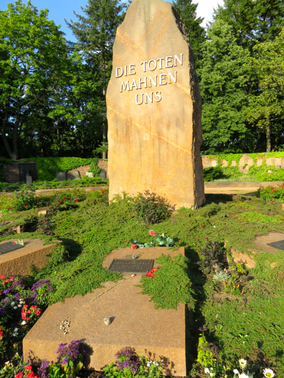 As we let go of one year and begin another, it is good to give thanks for all that has been and to open ourselves with fresh hope and compassion to the future. The two things are connected. My final visit in Berlin this year for example was a way of paying tribute both to past inspiration and to its continuing living 'subversive memory'. For in the Friedrichsfelde Central Cemetery are the graves of Karl Liebknecht and Rosa Luxemburg, among others commemorated at this Memorial to the Socialists. Other parts of the cemetery also house the graves of creative people, including the amazing artist Kathe Kollwitz. In some ways it is a sad place, not only as cemeteries typically can be, but also because of the failure of much of the vision and hard work of those buried there. Yet as the main commemorative stone has it Die Toten mahnen uns (The dead remind us), at their best, prompting us to renewing life and love. My politics have never been quite those of Liebknecht and Luxemburg, but I have always admired their commitment to a better world, sacrificial solidarity with the poor and outcast, intelligence and vision. To lay a flower on each of their graves was thus for me to express a debt of gratitude and to pledge with others to renew their work in a new way. My guess is that, in Rosa Luxemburg's case for sure, if they had not been murdered by the Freikorps in Berlin in 1919, their work would have been betrayed by others, including those indeed like one or two of the East German communist party apparatchiks buried alongside them. For being of Polish birth and Jewish extraction, and a feminist socialist with a physical disability and a brilliant independent mind, Rosa was always an uncomfortable figure to so many. Her most famous words sum this up and remain a powerful challenge and inspiration, whatever group(s) we belong to: Freedom only for the supporters of the government, only for the members of a party – however numerous they may be – is no freedom at all. Freedom is always the freedom of the dissenter. Not because of the fanaticism of "justice", but rather because all that is instructive, wholesome, and purifying in political freedom depends on this essential characteristic, and its effects cease to work when "freedom" becomes a privilege. For those words alone my pilgrimage would have been worthwhile, but there is much more. For to me, Rosa stands for many more, living and dead, who continue to believe in, inspire, and work, for another kind of world, however we imagine what Christians like me call 'the kingdom of God'. And so, for the coming year, in the words of the anarchist poet Pietro Gori, in Primo Maggio, written in 1890: Green May of humankind, Give your courage and your faith to our hearts. Give flowers to the rebels who failed Their sight fixed upon the break of dawn, To the bold rebel who fights and works To the far-seeing poet who sings and dies.
0 Comments
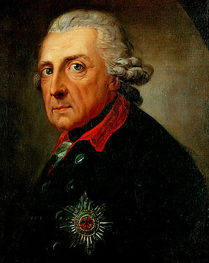 Anyone whom Adolf Hitler put a large portrait of prominently over his desk must have a dark side. This is certainly true of Frederick II of Prussia, commonly known as Frederick 'the Great'. A brilliant military general, he took full advantage of his father's consolidation of Prussian military power and became a potent symbol of German militarism, administrative efficiency, duty and enhancement of glory. Among his worst aspects was his treatment of Poland. Indeed, among his the oppressions which resonated with later Nazism, he boasted that he would gradually rid the world of Poles. The other side of Frederick was his so-called 'enlightened absolutism', which first drew me to him when I studied the 18th century 'enlightened despots' at school. Fascinated by radical thought and a leading sponsor of music, fine architectural buildings and the arts, Frederick was, for example, a notable patron of Voltaire. In some respects he also offered significant religious toleration within his realm, albeit with disdain for genuine religious faith, particular acts of active opposition to Polish Catholicism and with little real time for Jews. Whilst historians argue over his sexuality, with women certainly finding little place in his world, there may be some grounds for seeing positive aspects of homo-erotic life, albeit distorted by power. Aspects of his governance were also certainly forward-thinking, including sponsorship of immigration, recognition of the new United States of America and of the rights of prisoners of war, criticism of hunting, and protection of some plant life. The ambiguity of Frederick the Great, on so many levels, is partly explained by his context and upbringing, not least the brutality of his father's treatment of him and the deep-seated aggressive insecurities of Prussia as a whole, consequent on the bitter experiences of the Thirty Years War and other catastrophes. Understandable, if typically one-sided and distorted, Nazi enthusiasm for him has meant that both Eastern and Western Germans have subsequently been wary of his legacy. Yet he remains, in various senses, a fascinating figure, both as a symbol of the bad and good in German history itself, and of the human character. 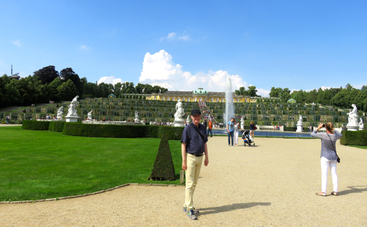 If walking through the Brandeburg Gate and down Unter den Linden this year was the fulfilment of a lifetime's desire, visiting Potsdam ran things close, particularly the visit to the astonishing 18th century summer palace Sans Souci. The name itself is French rather than German, reflecting its first owner's cosmopolitan aspect. Roughly translated it approximates to that key Australian term 'no worries'. What a blessing that would have been for much of German history and still would be for so much of our world today! Not generally a great fan of the buildings of the historically 'super-rich', I have nonetheless always been fascinated by Sans Souci, mainly for its association with Frederick the Great. I was not disappointed. Putting aside the cost, in various terms, it is an amazing creation and I was staggered as I turned a corner of the grounds and saw it afresh in all its ambiguous glory. 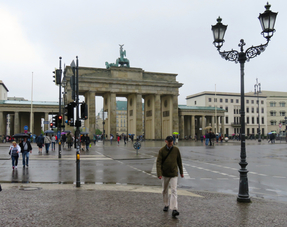 Looking back on 2015, there have been several major events in my life's journey. One was most certainly my visit to Berlin. It was the culmination of 50 years of longing: beginning as a young child when, in the magazine Look and Learn, I read about the beauty and history of the city and its division with the Berlin Wall. The desire was immediately kindled one day to walk through the Brandenburg Gate - in peace and not, like so many, for glory born of violence - and along Unter den Linden (see left, my longing finally fulfilled). The Brandenburg Gate and its surrounds in themselves have enough tragic, and sometimes liberating, history to touch my European and historian's heart for ever. As a history student, I also studied so much German history that led me further to Berlin. For the city as a whole is a symbol of the great human longing for hope and renewal, as well as a location of some of the very worst aspects of the human soul. Reading Rory MacLean's brilliant book Berlin in the months before further deepened my quest. For my closest life partner, it understandably felt at times a 'heavy' city, full of such a legacy of pain and struggle. Yet, for me, it was an amazing, if sometimes chastening, journey at every turn. After all, as a life-long border-crosser, where else could a blessed imp be drawn? 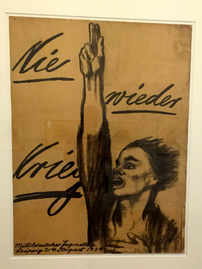 One of my main highlights of visiting Berlin this year was the Kathe Kollwitz museum. An artistic genius, Kollwitz' life and work are inspiring examples of the German soul. She was an outstanding pioneer for women, with a profound social conscience and identity. A committed socialist and pacifist, who shared the life of the poor with her doctor husband in Berlin's struggles, not for nothing was she commissioned to create a powerful memorial to the murdered Karl Liebknecht. Tragically, her compassion for the victims of war and oppression and the strength of poor women, especially mothers, was embodied in her own sufferings over the loss of her son in the first world war. Removed from her leading role in German arts and culture by the Nazis, she was eventually evacuated from Berlin in 1943 as foreign bombs wreaked violence, including, soon, the destruction of her own family apartment with its photographs and mementos of loved ones. A week later her son's home was also destroyed during a bombing raid. Kollwitz tellingly wrote in her journal: "every war already carries within it the war which will answer it. Every war is answered by a new war, until everything, everything is smashed... That is why I am so wholeheartedly for a radical end to this madness, and why my only hope is in a world socialism... Pacifism simply is not a matter of calm looking on; it is work, hard work." She died in 1945, 16 days before the end of the Second World War. Yet her transcendent art and inspiring hope, in and beyond suffering. lives on. I am struck by this week's collect for the end of Advent:
O Lord, raise up your power and come among us, and with great might succour us, that, whereas through our sins and wickedness we are sore let and hindered in running the race that is set before us, your bountiful grace and mercy may speedily help and deliver us; through your Son our Lord, to whom with you and the Holy Spirit be honour and glory, now and for ever. Amen. The language is clearly a modernised form of the 16th century expressions which helped form the historic Book of Common Prayer (BCP). As such, it has the kind of aural resonance that is loved many devotees of the BCP and King James Version of the Bible. For myself, though I am also a little wary of excessive use of what the Iona Community calls 'the language of the living room', such Tudor language can be often be somewhat dated for contemporary prayer and worship. However this prayer also reflects quite well certain aspects of both the character of Anglicanism and its distinctive theological outlooks. To say that, through sin and wickedness, we are 'sore let and hindered' is, for example, in my view, a less destructive view of the human condition than many. It avoids the 'total depravity' approach of Calvinism and other unbalanced conceptions. Yet it affirms the beauty and efficacious necessity of grace. As the last collect in today's main Australian Anglican Prayer Book, it is thus an appropriate lead in to Christmas. For the Incarnation affirms the embodied life of grace in humanity, essential for our redemption, yet celebratory of material existence as a whole. Pain, darkness and struggle are very real - for we are indeed 'sore. let and hindered' and typically in need of speedy help and deliverance - yet we are also participants in divine salvation and vehicles of honour and glory. Such is the miracle of Jesus Christ, born of Mary. One of my favourite Billy Bragg songs is Handyman Blues (see below for a video version with leading British comics): a wonderful consolation to those of us who are deeply admiring of our fathers and others differently abled, but who are far more capable with words and images than nails and hardware. I was thinking of this a few weeks ago when I made a rare trip to Bunnings Warehouse as part of a family wedding and move preparations in Canberra. What would be the equivalent of Bunnings Warehouse, I wondered, for those of us cursed and blessed with Handyman Blues? Perhaps it would be a Poetry Pavilion? As it happens, this year's London Book Fair instituted a Poetry Pavilion for the first time to promote poetry more fully (see here for one poet's account). How encouraging! In my soul's eye however, a Poetry Pavilion version of Bunnings Warehouse would be far more dramatic and quirky. For a start, quite unlike Bunnings' admirable practicality, like a Celtic rune, nothing would be straight, never mind the aisles. All would be curves and squirls, wiggles and squiggles. In contrast to the predictable sausage sizzle at the door, food would be of all varieties, with sensational mixes of spices and scents, and delicious wines abounding Instead of tools and serviceable items, in curious corners and angular alcoves, each decked with fascinating fabrics, metaphors and motifs would be hiding, with songs titles and dance themes a plenty. Nor would a single uniform be in sight. Everything would be free but would cost all that the heart requires. 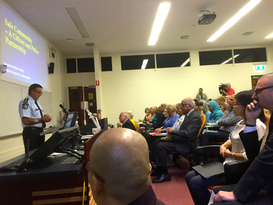 After the recent bombings in Paris, our Toowoomba Gooodwill Committee leadership decided to hold a gathering to bring together community leaders to strengthen our social cohesion and resilience. Held at the University of Southern Queensland this was well attended, facilitated by Professor Michael Cuthill and expert in research on social cohesion. Speakers also included the Mayor of Toowoomba Cllr Paul Antonio, Inspector Mike Curtin from Queensland Police Service, Venerable Wu Ping from Pure Land Learning College, Professor Ken Udas from USQ, and university student Sophie Ryan. Bishop Cameron Venables also led an engaging question and answer session with the panel of speakers and contributions from the floor - not least a several positive contributions from members of the Toowoomba Muslim community. Key themes included positivity, whole community engagement, valuing diversity, partnership building, leadership into action, open and truthful education, and acknowledgement of the need to read sacred scriptures and traditions in context and with a deep spirit of love and humanity, acknowledging potential 'texts of terror'. For my own introductory words as Goodwill chairperson click below on read more... 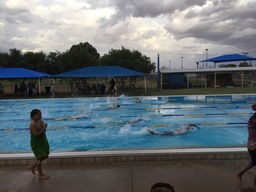 At the heart of the community of Cunnamulla in western Queensland is the town swimming pool. As in many Indigenous, or Indigenous-majority, communities, it plays a central role in fostering community, health, connections and life of various kinds. In Cunnamulla this is certainly notable, not least through the marvellous work of Marianne Johnstone who not only manages the facilities, including the 50 metre olympic-style pool, but wonderfully trains and leads swimming, triathlon and other activities. One of the highlights of our recent diocesan Reconciliation Action Plan initiative in Cunnamulla was therefore the Saturday afternoon swimming gala. The climax of this was the invitation relay race, led by the local mayor Lindsay Godfrey. Our group was encouraged to join in and bishop Cameron Venables and local Anglican Minister Steffan van Munster duly stepped forward to help form a team which came a very creditable third (the winners being an able relay of local Aboriginal young men). It was a powerful symbol of both Cameron and Steffan's ministry among local communities. Instead of simply sitting on the sidelines, or dispensing prizes (though bishop Cameron did that too!), they plunged right into the heart of community life, literally getting soaked in the process. Plunging into the pool is a powerful metaphor for what Christians call the incarnation, the way of Jesus which involves plunging fully into all life has to offer and all of the human condition. Sometimes Christianity, and Christian theology, has been a bit of an, albeit usually kindly and well-intentioned, onlooker activity. Getting wet however is not a real option for genuine ministry and mission. Gustavo Gutierrez, the great Latin American pioneer of liberation theology, reflected that a truly incarnational theology is 'the second act', after the commiitment to life, justice, solidarity with the poor, peace and reconciliation. This is certainly true of the journey of Australian Reconciliation as well as faith development in general. What of my involvement in the pool, you might ask? Well, being a water-challenged person on account of my very British and rural upbringing (far from the unwelcoming cold seas around the UK and at a distance from a pool like Cunnamulla's), I did not myself jump in that pool, although I did offer to join either the running or cycling leg of any similar triathlon. Yet I hope that, in other things I do, I also have the faith to keep plunging in the pool of life. We also have to reflect but active participation is vital. Jump in, as they say in Cunnamulla, the water is wonderful. |
AuthorJo Inkpin is an Anglican priest serving as Minister of Pitt St Uniting Church in Sydney, a trans woman, theologian & justice activist. These are some of my reflections on life, spirit, and the search for peace, justice & sustainable creation. Archives
July 2024
Categories
All
|
 RSS Feed
RSS Feed